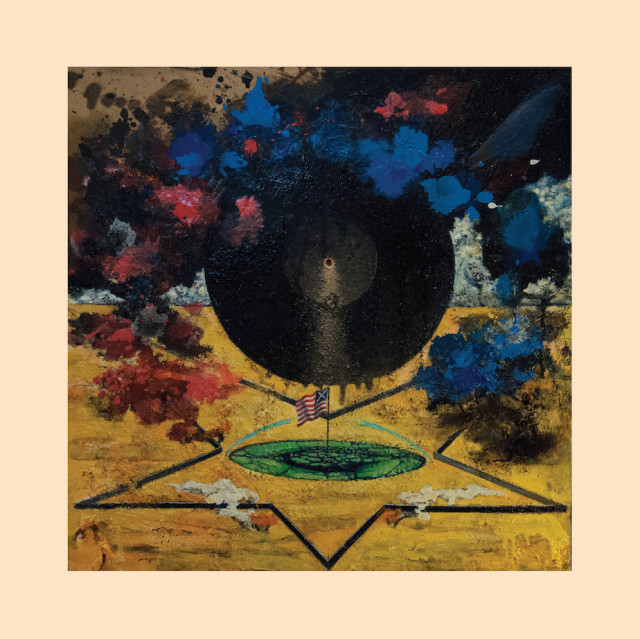The moment when a great post-hardcore song lurches into high gear is one of the greatest, most exciting moments that music can give us. Think of the tom roll on Fugazi's "Waiting Room," the Ric Flair woo! on Refused's "New Noise," the whoooa-ohhhh-ohhhh break on Black Eyes' "Deformative." I'm hopelessly biased because, at least to some degree, I grew up with this stuff. But for me, most of the time, moments like that trump euphoric house-anthem build-ups and classic-rock riff-surges and big rap hooks that everyone in the room knows. They're just the best. Post-hardcore -- way more than straight-up hardcore, which was once about speed and is now more about constant, brute-force impact -- uses tension as its engine. It's what moves the music forward. So when that tension turns into something like release, it can make you feel like you could knock a minivan over with a headbutt.
Before A Million Universes, the new album from the New York band Big Ups, doesn't have any moments on the level of the three I just named -- or, if those moments are on there, they haven't hit me quite the right way yet. But Big Ups know how to be a post-hardcore band. They understand the way that tension-and-release dynamic can work when everything is clicking just right. Big Ups songs have structure, and they're not verse-chorus-verse structure. Instead, they move from quiet, ominous builds to sudden eruptions of savage riffage and open-throated roars. And when they're about to switch from Slint-style contemplative churn to smash-it-up catharsis, you can feel it the way you feel an air-pressure change when an airplane drops altitude suddenly. You can feel it in your stomach.
I can't front: This stuff preys hungrily on all my deep-seated personal pleasure centers, the thoughts and feelings that were deep in me long before I even considered "writing about music" as a viable career path. If a band sounds like something I might have encountered in an Arlington basement in 1996 -- a band whose singer would invariably end up writhing around on the ground, mic cord wrapped around his arm -- I am going to find some nice things to say about that band. But no bands sound like that anymore, at least as far as I know. Most bands in the DIY underground seem to favor a sort of splintered-skronk melodicism, and very few go for the jugular the way Big Ups do. Part of the reason bands from the so-called emo revival so rarely grab me is that I never really cared about the Get Up Kids or Braid back in the day, and that's the well these guys are drawing from. Big Ups don't sound like Pg. 99 or Universal Order Of Armageddon or whatever, but they at least exist on that same aesthetic spectrum, and that stuff was always way more my speed.
When I encountered Big Ups' debut album, Eighteen Hours Of Static, it was during a particularly barren week in January of 2014, and I got that immediate what the fuck is this? reaction that every critic always searches for. Here was a band playing combustible, angry, raw, immediate post-hardcore, a genre basically lost to history, and playing it well. Of course I was going to lose my shit for it. But Eighteen Hours was, on its own terms, a very good underground rock album, one that took its chosen aesthetic and just went for it full-bore. Along those same lines, Before A Million Universes is exactly what you want from a sophomore album. It's no radical departure from its predecessor. Instead, it takes what the first album did well and deepens it. The band feels more confident and intuitive. They spend less of the album going full-speed. Instead, they devote more energy to the clangy, ominous down moments, using those moments to build to these hugely satisfying bugouts that hit even harder than they did last time. They're still themselves, just a better and more fully developed version.
Big Ups know what they're doing. They're not suburban kids recording on four-tracks, doing whatever they can to bare their souls to the world. Instead, they're all young men with New York addresses and intricate knowledge about how to make music. All four members of the band met when they were studying music technology at NYU. That means their dry, grimy, spartan sound is an aesthetic choice, not a matter of necessity. They've figured out exactly how to record themselves to make their music hit hardest. And maybe that robs the music of some of its romance, but it also makes the craftsmanship easier to admire. Knowing exactly the right place to put the guitar-skree breakdown is a different skill from knowing how to write a bridge, but maybe the two are more related than we knew.
Lyrically, there are a few moments where frontman Joe Galarraga hits on a big, concrete idea: "Tell me what you're worth / Salary, two weeks off from work? / Call them benefits and perks." But most of the time, he's operating in classic-hardcore the-world-is-fucked boilerplate -- "Apathy / So total / Selfishness / Hollow soul" -- or he's operating way above my head. The album's title is a line from a Walt Whitman poem, and I only know that because it says so in the press kit. There's at least one other Whitman reference, too; the final song is called "Yawp." (The phrase "barbaric yawp" is literally the only Whitman I remember.) But at least from where I'm sitting, the lyrics matter less that the way Galarraga gives off the sense that he needs us to hear this stuff; that he needs to howl all of this off into the darkness in order to even feel okay.
Whether or not Big Ups are consciously trying to evoke the post-hardcore I grew up with, that's the quality that they're capturing and reflecting here. They've made this erratic, seesawing, powerful, intuitive music. And they're doing it with this razor-wire intensity, playing it as if it's both the only thing they know how to do and the only thing keeping them sane. It's an album with bruising force and real emotional stakes. That's a special thing, in any era.
Before A Million Universes is out 3/4 on Exploding In Sound. Stream it below.
[videoembed size="full_width" alignment="center"][/videoembed]
Other albums of note out this week:
• Heron Oblivion's way-out self-titled psych debut.
• ROMP's breakneck power-pop debut Departure From Venus.
• Muncie Girls' badass pop-punk debut From Caplan To Belsize.
• Poliça's atmospheric synthpopper United Crushers.
• La Sera's bright, Ryan Adams-produced Music For Listening To Music To.
• Guerrilla Toss' euphoric spaz-punker Eraser Stargazer.
• Violent Femmes' out-of-nowhere comeback effort We Can Do Anything.
• Prince Rama's extreme sports-themed Xtreme Now.
• Nicholas Krgovich's vaguely sleazy The Hills.
• Miike Snow's sparkling festival-popper iii.
• M. Ward's solo return More Rain.
• Låplsey's sharp, polished full-length debut Long Way Home.
• Thao & The Get Down Stay Down's idiosyncratic, personal A Man Alive.
• Loretta Lynn's classical-country visitation Full Circle.
• The self-titled debut from Kim Gordon's new psych duo Glitterbust.
• Inverloch's slow, crushing metal wallow Distance | Collapsed.
• Guided By Voices frontman Robert Pollard's solo effort Of Course You Are.
• Jennifer O'Connor's warm, lived-in Surface Noise.
• Lionlimb's '70s-pop-influenced Shoo.
• Anna Meredith's giddily minimal Varmints.
• Melaena Cadiz's dreamy folk album Sunfair.
• Wussy's swirling roots-rocker Forever Sounds.
• Smoke DZA's Harry Fraud collaboration He Has Risen.
• Fool's Gold frontman Luke Top's solo debut Suspect Highs.
• Sound Of Ceres' psychedelic dreampop album Nostalgia For Infinity.
• Baby Birds Don't Drink Milk's lush, orchestrated DIY album Burritos.
• Pinback offshoot Rob Crow's Gloomy Place's confessional debut You're Doomed. Be Nice.
• Anenon's abstract jazz zone-out Petrol.
• Eddi Front's darkly intimate Marina.
• Yndi halda's orchestral pop return Under Summer.
• Ihsahn's progressive black metaller Arktis.
• Nada Surf's dependably sharp You Know Who You Are.
• The British Red Cross benefit compilation The Long Road.
• TOKiMONSTA's Forevere mini-album.
• Craig Finn's Newmyer's Roof EP.
• The Big Pink's Empire Underground EP.
• Day Wave's Hard To Read EP.
• Et aliae's Rose EP.
• Josienne Clarke & Ben Walker's Through The Clouds EP.
• EERA's self-titled EP.






